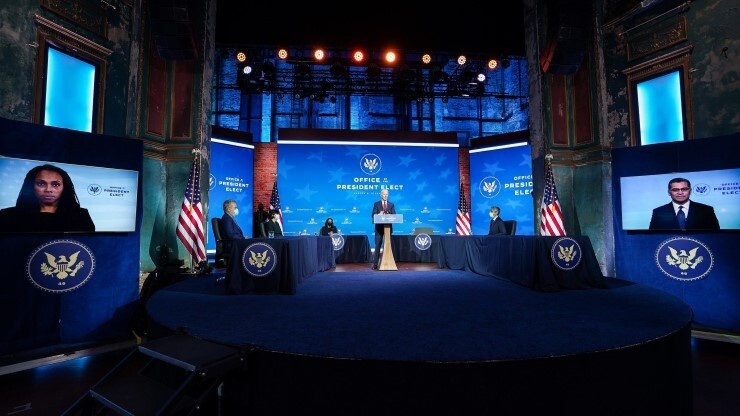
President-elect Biden announced his picks for core public health positions yesterday at an event in Delaware.
(Image credit – Office of President-elect Biden)

President-elect Biden announced his picks for core public health positions yesterday at an event in Delaware.
(Image credit – Office of President-elect Biden)
Amid the largest surge of COVID-19 cases in the U.S to date, yesterday President-elect Joe Biden announced
In parallel, Biden has begun to build out a leadership team for another of his top priorities
Biden debuted his health team picks at an event near his transition office in Wilmington, Delaware, at which each delivered brief remarks
Rochelle Walensky, chief of infectious diseases at Massachusetts General Hospital and a Harvard Medical School professor, will lead the Centers for Disease Control and Prevention, a role that does not require Senate confirmation. Walensky has focused her research on HIV/AIDS policy and interventions in resource-limited settings. In accepting the role, she drew parallels between her experience as a medical student witnessing the devastation of the AIDS epidemic with what she is seeing now with COVID-19 patients. She will replace current CDC Director Robert Redfield.
Jeffrey Zients, a director of the National Economic Council under President Obama, will serve as the White House’s COVID-19 response coordinator, another position that does not require Senate confirmation. During the Obama administration, he also served as deputy director of the Office of Management and Budget and led the 2013 “tech surge”
Xavier Becerra, currently California’s Attorney General, will be nominated to be secretary of health and human services, making him the first Latino tapped to lead the department. A lawyer and former member of Congress, Becerra has been a leading critic of the Trump administration’s efforts to unravel the Affordable Care Act, organizing a multi-state suit to defend the law. Becerra was the chair of the House Democratic Caucus from 2013 to 2017, when the California governor appointed him attorney general after Kamala Harris vacated that role to take her seat in the Senate. Becerra would replace current HHS Secretary Alex Azar.
Vivek Murthy, a physician who served as surgeon general from 2014 to 2017, will be nominated to return
Marcella Nunez-Smith, another co-chair of the COVID-19 Advisory Board, will chair a newly created COVID-19 Equity Task Force. In describing the role, Biden said Nunez-Smith will “lead our efforts to provide care to the communities most in need and most affected by the pandemic and most often overlooked.” She is currently a Yale University public health professor and founding director of the Equity Research and Innovation Center.
Anthony Fauci will continue as director of the National Institute of Allergy and Infectious Diseases, a role he has had since 1984, when he first rose to prominence during the AIDS epidemic. He will also serve as “chief medical adviser” to Biden on COVID-19.
At the event, Biden outlined his initial plan for addressing COVID-19, which he said was developed in consultation with Fauci. He said it will include an executive order to “require masks where I can — like federal buildings and interstate travel on planes, trains, and buses.”
Committing to carry out at least 100 million vaccinations within the first 100 days of his administration, Biden called on Congress to pass legislation immediately to increase support for vaccine rollout, referencing a bipartisan proposal
“Without urgent action this month by Congress to put sufficient resources into vaccine distribution and manufacturing — which the bipartisan group is working on — there is a real chance that, after an early round of vaccinations, the effort will slow and stall,” he said.

Then-Secretary of State John Kerry, center, discussing a draft environmental agreement at the COP21 climate change conference in 2015. President-elect Biden has selected Kerry as a special climate envoy and former Obama senior adviser Brian Deese, third from left, as director of the National Economic Council.
(Image credit – State Department)
John Kerry’s selection as climate envoy marks a return to the Obama administration’s emphasis on mitigating climate change. The former Democratic senator and 2004 presidential nominee made climate change a major priority when he served as Obama’s secretary of state from 2013 to 2017, including as the leading U.S. representative at the 2015 conference that negotiated the Paris Climate Agreement. Biden has committed to rejoin the agreement as one of his first acts as president.
Since leaving office, Kerry has continued to advocate
Biden has also emphasized climate credentials in his selection
As the Biden transition gains steam, a number of science agency picks could be announced sooner rather than later.
Speaking on a panel
“One of the things I think we pulled off in the Obama transition was to put a spotlight on personnel by doing a simultaneous announcement of John Holdren, Eric Lander, Steve Chu, and Jane Lubchenco, to put a spotlight on the fact that Obama respected science [and] was going to elevate it in decision making,” Podesta said, referring to Obama’s picks to lead the White House Office of Science and Technology Policy, President’s Council of Advisors on Science and Technology, Department of Energy, and the National Oceanic and Atmospheric Administration, respectively.
Podesta also offered predictions for early Biden actions in science policy, which he said may include an executive order on scientific integrity and science-based decision making. He added the new administration will tap “top tier scientists” to work at OSTP and use the office to “identify major cross-cutting issues in climate science, in biomedical science, and bioinformatics.”
On climate science specifically, Podesta predicted the administration will update the social cost of carbon
Podesta concluded by predicting the administration will propose “doubling or even tripling scientific R&D, particularly aimed at climate and hard-to-decarbonize sectors that are really in need of more scientific research as well as policy action.”